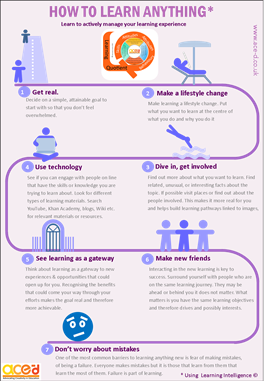How to Learn Anything
Some time ago I came across a TEDx Blog by Krystian Aparta about an “Open Translation Project” where translators shared their secrets to mastering a foreign language. This got me to thinking about learning and what I call “Learning Intelligence” or “LQ”
First, a bit about LQ
LQ is our ability to adapt our environment to meet our learning needs. This is just what these translators were doing – managing their learning environment to make learning easier and quicker. LQ consists of a set of skills, attitudes, attributes and behaviours (easy to remember “SAAB”) we can develop to help us learn. What the translators were doing is a great example of using LQ to learn and you can use this approach to learn anything.

So I set about changing the language and examples used by the translators to make it appropriate to learning anything using LQ.
The Poster
The outcome is 7 things any learner you can do to learn anything. They are quite simple things to do but bring huge benefits making learning easier and quicker. See what you think, I have created a graphic to showcase the 7 stages in how to learn anything.
Here are brief descriptors of each one to go along with the poster.
Task 1
Start with “Get real”, a way of ensuring your goals are achievable. Some people use the acronym “SMART” for targets or goals. SMART targets are specific, measurable, realistic and time-related. If you Google SMART targets you will find them in use in business, coaching and other areas of life. The meaning of some of the letters can change “relevant” or realistic” is an example. They are ideally realistic, achievable within the time frame and can be supported by whatever else you are doing. Don’t take on too much at once.
Task 2
This task is about arranging things so that what you want to learn is part of your life, you are reminded or encouraged throughout the day to keep learning. Reminder or information notes around the house can be one strategy you use or joining a club another.
Task 3
There is often more to learn about something than what you first think so go exploring. What you discover and experience can help you learn easier and remember much more making the topic far more interesting and memorable.
Task 4
Technology (mobile phones, computers, tablets etc) are all excellent ways of accessing information. Just be careful and remember that not everything you read is accurate or true. You can also join forums and ask questions. For more about “e-learning” see this article and guide.
Task 5
Knowing why you are learning something is important for being motivated. Find out what the benefits of learning will be for you and when. Learning to drive may give you independence and becoming awesome at manipulating numbers may help you get a job.
Task 6
Learning on your own is hard, learning with others who want to learn the same thing is much easier. You will find you can quiz each other or set each other challenges or just revise. You can also receive encouragement from others when things get difficult to understand (they normally do when learning something new)
Task 7 is an important reminder not to worry about making mistakes. We all make mistakes and one common barrier to learning is the fear of failing but that this is just a step towards achieving your goal. Okay not a big step and perhaps a backwards step at times but a step none the less. Learn from your mistakes.
The Poster
I am happy for you to download and use the above graphic but please acknowledge the source.
There is much more about learning, motivation, engagement and how to learn anything in my book, If you can’t reach them you can’t teach them. Building effective learning relationships.

Reblogged this on The Learning Renaissance.
LikeLike